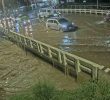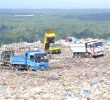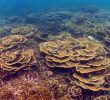CAGAYAN DE ORO CITY, Philippines — A “green wish list” prepared by leaders of various environmental, health and justice organizations identified key environment issues that they want President Ferdinand Marcos Jr. to prioritize in his administration.
With the Philippines being among the most vulnerable to climate impacts, the groups want Marcos to put climate action and climate justice as his top priority.
This means dropping all plans for nuclear power plants, stopping the further expansion of fossil fuels, including fossil gas, and holding carbon major companies accountable for pollution and human rights abuses from their business operations, according to Greenpeace-Philippines.
“If he is sincere in his pronouncements on climate action and promoting renewable energy, Ferdinand Marcos Jr. must drop all plans for nuclear energy and fossil gas. He must also follow through with holding fossil fuel companies accountable for their role in abetting the climate crisis,” said Lea Guerrero, country director of Greenpeace Philippines.
Waste management
Another mounting problem the groups want to address is garbage and pollution. EcoWaste Coalition said the Marcos government should commit itself to “sustainable and socially just waste policy and programs, and suspend, if not reverse, shift to waste-to-energy incineration and other false, quick-fix solutions.”
One of the proposals raised by EcoWaste is for government to “issue an executive order to hasten the phase-out of non-environmentally acceptable products and packaging (NEAPP), with single-use plastics (SUPs) as an immediate priority.”
Aileen Lucero, national coordinator of the EcoWaste Coalition, also said the government needs to fast track the ratification of the Basel Convention Ban Amendment (an international law banning hazardous waste exports from developed to developing countries) and stop waste importation.”
“We also urge Pres. Marcos to reiterate (the Philippine) government’s commitment to achieve a polychlorinated biphenyls (PCB)-free Philippines by 2025 and ensure compliance to all other chemical safety-related targets, including, but not limited to, 2020 phase-out of mercury-added products and 2017 and 2019 phase-out of lead-containing decorative and industrial paints,” she added.
Sonia Mendoza, chairperson of the Mother Earth Foundation, also points out the need to effectively implement the Ecological Solid Waste Management Act, emphasizing “no biodegradables should be allowed in landfills to mitigate climate change” as these disposal facilities are a significant source of methane emissions globally.
“I hope BBM can realize the blatant violations of RA 9003 since its promulgation. With this realization, I expect him to command the law’s faithful implementation to save on precious public funds appropriated for ‘waste mismanagement’ and protect the environment against an impending destruction because of the violations. If not BBM, I hope the Commission on Audit will see the blatant violations,” added Rene Pineda, president of the Consumer Rights for Safe Food (CRSF).
Protecting democracy
Both Greenpeace and EcoWaste Coalition emphasized the importance of promoting and protecting the rights of the people and civil society organizations, as guaranteed in the Constitution, in the pursuit of green governance and sustainability.
“The key to a healthy environment is a healthy democracy. To promote this, Marcos Jr. must support people’s participation in governance, strengthen democratic institutions, and advance and protect justice and human rights. We believe that he will only be able to do this successfully if he uses this opportunity, now that he has been elected as president, to acknowledge and remediate the transgressions committed by his family during his father’s dictatorship,” said Greenpeace’s Guerrero.
Lucero, meanwhile, said the new government should “develop a legislative agenda for the environment and the sound management of chemicals, with active participation of rights holders and impacted communities and sectors, to adequately address waste and pollution issues amid a climate emergency.”
She added that the government should “stop red-tagging environmental defenders and ensure an open, democratic and safe space for the people and civil society groups to participate in the mammoth task of protecting public health and preserving the environment.”
Food security
Lawyer Gloria Estenzo-Ramos, vice president of Oceana Philippines, highlighted the importance of prioritizing food security and resiliency against climate change impacts, stressing “we have to address overfishing and illegal commercial fishing in the municipal waters which are reserved for our artisanal fisherfolk.”
She said that reforms under RA 10654 (a law amending the Philippine Fisheries Code) and under the Duterte administration need to be seriously implemented.
“The target is for 100% compliance by commercial fishing vessel operators of the vessel monitoring requirement, with criminal and civil sanctions imposed against violators of our fisheries laws and regulations. The tide will turn if this is complied by all,” Estenzo-Ramos said.
Puerto Princesa City-based lawyer Grizelda Mayo-Anda, Executive Director, Environmental Legal Assistance Center (ELAC), pointed out that the government should “stop mining and other extractive and destructive infrastructure projects (roads, reclamation) in all natural forests, watersheds and protected areas.” (davaotoday.com)










